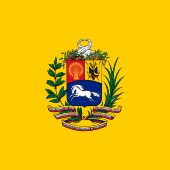List of Presidents of Venezuela
 |
| This article is part of a series on the politics and government of Venezuela |
|
Executive |
|
Legislature |
|
Judiciary |
| Foreign relations |
|
Politics portal |
The following is a list of Presidents of the Bolivarian Republic of Venezuela (Spanish: Presidentes de la República Bolivariana de Venezuela).
The President is both the head of state and head of government in Venezuela's presidential system. The current presidential term is for six years with the constitutionally guaranteed recourse of holding a popular recall referendum any time within the last three years of a presidential term. A 2009 referendum removed the previous restrictions which limited the President to two terms.[1] The current president of Venezuela is Nicolás Maduro, since April 19, 2013.
History
Before 1830
The presidential designation encompasses only those persons who were sworn into office as President of Venezuela following Venezuela's declaration of independence from Spanish colonial rule, which took effect on July 5, 1811. The first president, taking office on July 5, 1811, was actually the president of a triumvirate of the first established Republic of Venezuela that rotated the presidency weekly. The person serving as president during the week of July 5 was one of the three signatories of the Declaration of Independence: Cristóbal Mendoza. Mendoza shared the triumvirate with Juan Escalona and Baltasar Padrón. A second triumvirate followed on April 3, 1812 whose members were Francisco Espejo, Fernando Toro and Francisco Javier Ustariz.[2][3]
Owing to the profound confusion of the Venezuelan War of Independence and the period of Gran Colombia over what is now Venezuela, this page has gaps between 1813 and 1819. For this period in time, historians refer to the Republic of Venezuela as the Second Republic of Venezuela (1813–1814) and the Third Republic of Venezuela (1817–1819) as Simon Bolivar twice reestablished the republic. The Congress of Angostura appointed Simón Bolívar "Jefe Supremo de la República de Venezuela" (Supreme Commander of the Republic of Venezuela) from 1819 until 1830.
After 1830
In 1830, José Antonio Páez declared Venezuela independent from Gran Colombia and became president, taking office on January 13, 1830. Although he was not the first president of Venezuela (having in mind Cristóbal Mendoza in 1811), he was the first head of state of independent Venezuela, after the dissolution of Gran Colombia.
Presidents of Venezuela since independence (1830–present)
The list below includes interim "caretaker" as well as regular serving presidents, and democratically installed presidents as well as those installed by other means (e.g.; Marcos Pérez Jiménez).
State of Venezuela (1830–1864)
Political parties Conservative Party Liberal Party Independent Military government
| | ||||||
|---|---|---|---|---|---|---|
| Portrait | Name (Birth–Death) |
Term in office — Political party |
Form of entry | Occupation | ||
| |
José Antonio Páez (1790–1873) |
13 January 1830 | 20 January 1835 | Indirect elections | General | |
| Conservative Party | ||||||
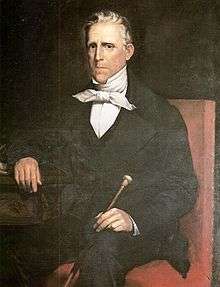 |
Andrés Narvarte (1781–1853) |
13 January 1835 | 9 February 1835 | Interim government | Lawyer | |
| Conservative Party | ||||||
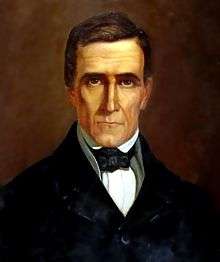 |
José María Vargas (1786–1854) |
9 February 1835 | 9 July 1835 | Indirect elections | Physician | |
| Conservative Party | ||||||
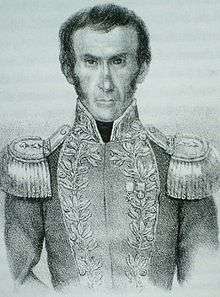 |
José María Carreño (1792–1849) |
27 July 1835 | 20 August 1835 | Interim government | General | |
| Conservative Party | ||||||
 |
José María Vargas (1786–1854) |
20 August 1835 | 24 April 1836 | Restoration | Physician | |
| Conservative Party | ||||||
 |
Andrés Narvarte (1781–1853) |
24 April 1836 | 20 January 1837 | Interim government | Lawyer | |
| Conservative Party | ||||||
 |
José María Carreño (1792–1849) |
27 January 1837 | 11 March 1837 | Interim government | General | |
| Conservative Party | ||||||
 |
Carlos Soublette (1789–1870) |
11 March 1837 | 1 February 1839 | Interim government | General | |
| Conservative Party | ||||||
| |
José Antonio Páez (1790–1873) |
1 February 1839 | 28 January 1843 | Indirect elections | General | |
| Conservative Party | ||||||
 |
Carlos Soublette (1789–1870) |
28 January 1843 | 20 January 1847 | Indirect elections | General | |
| Conservative Party | ||||||
 |
José Tadeo Monagas (1784–1868) |
20 January 1847 | 5 February 1851 | Indirect elections | General | |
| Conservative Party | ||||||
 |
José Gregorio Monagas (1795–1858) |
5 February 1851 | 20 January 1855 | Indirect elections | General | |
| Liberal Party | ||||||
 |
José Tadeo Monagas (1784–1868) |
20 January 1855 | 15 March 1858 | Indirect elections | General | |
| Liberal Party | ||||||
 |
Pedro Gual Escandón (1783–1862) |
15 March 1858 | 18 March 1858 | Interim government | Lawyer | |
| Liberal Party | ||||||
 |
Julián Castro (1810–1875) |
18 March 1858 | 2 August 1859 | Coup d'état | General | |
| Military | ||||||
 |
Pedro Gual Escandón (1783–1862) |
2 August 1859 | 29 September 1859 | Interim government | Lawyer | |
| Independent | ||||||
 |
Manuel Felipe de Tovar (1803–1866) |
29 September 1859 | 20 May 1861 | Coup d'état (first term) Direct elections (second term) |
Politician | |
| Liberal Party | ||||||
 |
Pedro Gual Escandón (1783–1862) |
20 May 1861 | 29 August 1861 | Interim government | Lawyer | |
| Liberal Party | ||||||
| |
José Antonio Páez (1790–1873) |
29 August 1861 | 15 June 1863 | Dictatorship | General | |
| Military | ||||||
 |
Juan Crisóstomo Falcón (1820–1870) |
15 June 1863 | 25 April 1868 | Victory in the Federal War (first term) Indirect elections (second term) |
General | |
| Military | ||||||
United States of Venezuela (1864–1953)
Political parties Conservative Party Liberal Party Independent Military government
| | ||||||
|---|---|---|---|---|---|---|
| Portrait | Name (Birth–Death) |
Term in office — Political party |
Form of entry | Occupation | ||
 |
Juan Crisóstomo Falcón (1820–1870) |
15 June 1863 | 25 April 1868 | Victory in the Federal War (first term) Indirect elections (second term) |
General | |
| Military | ||||||
 |
Manuel Ezequiel Bruzual (1832–1868) |
25 April 1868 | 28 June 1868 | Interim government | Officer | |
| Independent | ||||||
 |
Guillermo Tell Villegas (1823–1907) |
28 June 1868 | 20 February 1869 | Interim government | Lawyer | |
| Liberal Party | ||||||
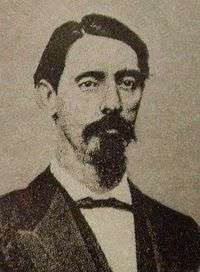 |
José Ruperto Monagas (1831–1880) |
20 February 1869 | 16 April 1870 | Revolution | General | |
| Military | ||||||
 |
Guillermo Tell Villegas (1823–1907) |
16 April 1870 | 27 April 1870 | Interim government | Lawyer | |
| Liberal Party | ||||||
| |
Antonio Guzmán Blanco (1829–1899) |
27 April 1870 | 27 February 1877 | Revolution (first term) Indirect elections (second term) |
General/Lawyer | |
| Liberal Party | ||||||
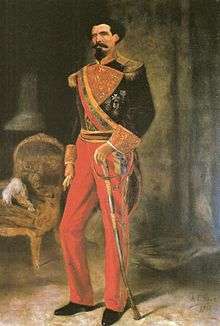 |
Francisco Linares Alcántara (1825–1878) |
27 February 1877 | 30 November 1878 | Indirect elections | General | |
| Liberal Party | ||||||
 |
José Gregorio Valera | 30 November 1878 | 26 February 1879 | Interim government | General | |
| Liberal Party | ||||||
| |
Antonio Guzmán Blanco (1829–1899) |
26 February 1879 | 26 April 1884 | Elections by Federal States | General/Lawyer | |
| Liberal Party | ||||||
 |
Joaquín Crespo (1830–1898) |
26 April 1884 | 15 September 1886 | Elections by Federal States | General | |
| Liberal Party | ||||||
| |
Antonio Guzmán Blanco (1829–1899) |
15 Septiembre 1886 | 8 August 1887 | Elections by Federal States | General/Lawyer | |
| Liberal Party | ||||||
 |
Hermógenes López (1830–1898) |
8 August 1887 | 2 July 1888 | Interim government | General | |
| Independent | ||||||
_by_Cristobal_Rojas.jpg) |
Juan Pablo Rojas Paúl (1826–1905) |
2 July 1888 | 19 March 1890 | Elections by Federal States | Lawyer | |
| Liberal Party | ||||||
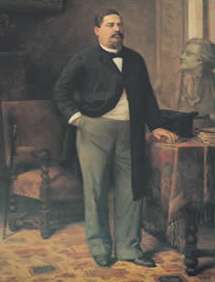 |
Raimundo Andueza Palacio (1846–1900) |
19 March 1890 | 17 June 1892 | Elections by Federal States | Lawyer | |
| Conservative Party | ||||||
 |
Guillermo Tell Villegas (1823–1907) |
17 June 1892 | 31 August 1892 | Interim government | Lawyer | |
| Liberal Party | ||||||
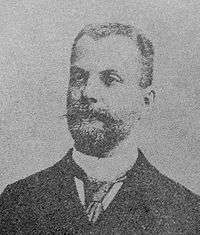 |
Guillermo Tell Villegas Pulido (1854–1949) |
31 August 1892 | 7 October 1892 | Interim government | Lawyer | |
| Liberal Party | ||||||
 |
Joaquín Crespo (1841–1898) |
7 October 1892 | February 28 1898 | Revolution (first term) Elections by Federal States (second term) |
General | |
| Military | ||||||
 |
Ignacio Andrade (1839–1925) |
28 February 1898 | 20 October 1899 | Direct elections | Politician | |
| Liberal Party | ||||||
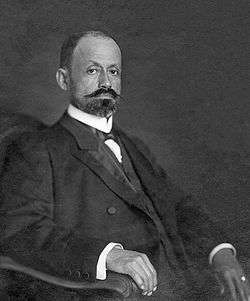 |
Cipriano Castro (1858–1924) |
20 October 1899 | 19 December 1908 | Revolution | General | |
| Military | ||||||
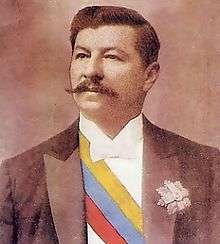 |
Juan Vicente Gómez (1857–1935) |
19 December 1908 | 5 August 1913 | Coup d'état | General | |
| Military | ||||||
 |
José Gil Fortoul (1861–1943) |
5 August 1913 | 19 April 1914 | Interim government | Lawyer | |
| Independent | ||||||
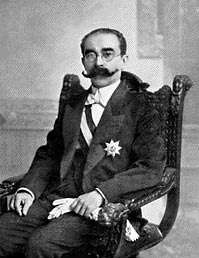 |
Victorino Márquez Bustillos (1858–1922) |
19 April 1914 | 24 June 1922 | Interim government[4] | Lawyer | |
| Independent | ||||||
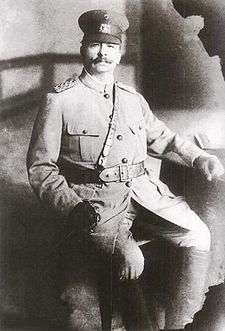 |
Juan Vicente Gómez (1857–1935) |
24 June 1922 | 30 May 1929 | — | General | |
| Military | ||||||
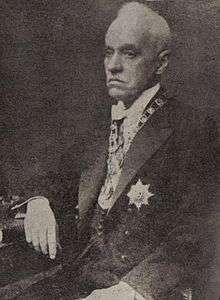 |
Juan Bautista Pérez (1869–1952) |
30 May 1929 | 13 June 1931 | Indirect elections | Lawyer | |
| Independent | ||||||
 |
Juan Vicente Gómez (1857–1935) |
13 June 1931 | 17 December 1935 | Indirect election | General | |
| Military | ||||||
 |
Eleazar López Contreras (1883–1973) |
18 December 1935 | 5 May 1941 | Interim government (first term) Indirect elections (second term) |
General | |
| Independent | ||||||
 |
Isaías Medina Angarita (1897–1953) |
5 May 1941 | 18 October 1945 | Indirect elections | General | |
| Democratic Party | ||||||
| |
Rómulo Betancourt (1908–1981) |
18 October 1945 | 17 February 1948 | Coup d'état | Politician | |
| Democratic Action | ||||||
 |
Rómulo Gallegos (1884–1969) |
17 February 1948 | 24 November 1948 | Direct elections | Writer | |
| Democratic Action | ||||||
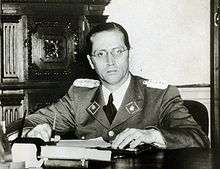 |
Carlos Delgado Chalbaud (1909–1950) |
24 November 1948 | 30 November 1950 | Coup d'état | Officer | |
| Military | ||||||
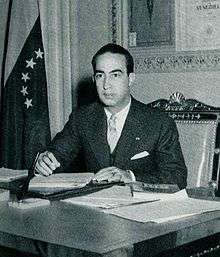 |
Germán Suárez Flamerich (1907–1990) |
30 November 1950 | 2 December 1952 | Interim government | Lawyer | |
| Independent | ||||||
Republic of Venezuela (1953–1999)
Venezuela took the name of Republic of Venezuela (Spanish: República de Venezuela) with the adoption of the 1953 constitution, written by the Constituent Assembly elected in November 1952. The Presidents of Venezuela under this constitution (as well as the 1961 Constitution, which kept the name) were officially styled as President of the Republic of Venezuela.
This period of the history of Venezuela began with the presidency of Marcos Pérez Jiménez, widely perceived to be a dictator.[5][6] After a short period of political instability following Pérez Jiménez's exile in 1958, democracy was restored in the country with the election of Democratic Action leader Rómulo Betancourt as President in 1959. This marked the beginning of the so-called Fourth Republic of Venezuela, which was characterized by the prevalence of the Punto Fijo Pact and the bipartidism of the two main political parties in the country at the time, Democratic Action and Copei.
The second presidency of Carlos Andrés Pérez (1989–93) saw a deep economic crisis, major riots in which hundreds were killed by security forces (the Caracazo, 1989), two coup attempts in 1992, and the 1993 impeachment of Pérez. That same year, Rafael Caldera became the first President of Venezuela not to belong to either Democratic Action or Copei in over forty years, having been elected under the banner of National Convergence. The Fourth Republic officially ended in 2001 when a new constitution entered in force.
Political parties Democratic Party Democratic Action Copei National Convergence Fifth Republic Movement
| | ||||||
|---|---|---|---|---|---|---|
| Portrait | Name (Birth–Death) |
Term in office — Political party |
Form of entry | Occupation | ||
| |
Marcos Pérez Jiménez (1914–2001) |
2 December 1952 | 23 January 1958 | Indirect elections | Officer | |
| Military | ||||||
.svg.png) |
Wolfgang Larrazábal (1911–2003) |
23 January 1958 | 14 November 1958 | Coup d'état | Rear admiral | |
| Independent | ||||||
.svg.png) |
Edgar Sanabria (1911–1989) |
14 November 1958 | 13 February 1959 | Coup d'état | Rear admiral | |
| Independent | ||||||
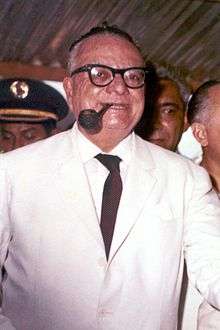 |
Rómulo Betancourt (1908–1981) |
13 February 1959 | 13 March 1964 | Direct elections | Politician | |
| Democratic Action | ||||||
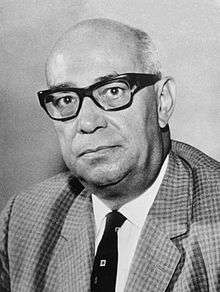 |
Raúl Leoni (1905–1972) |
13 March 1964 | 11 March 1969 | Direct elections | Lawyer | |
| Democratic Action | ||||||
 |
Rafael Caldera (1916–2009) |
11 March 1969 | 12 March 1974 | Direct elections | Lawyer | |
| Copei | ||||||
 |
Carlos Andrés Pérez (1922–2010) |
12 March 1974 | 12 March 1979 | Direct elections | Politician | |
| Democratic Action | ||||||
 |
Luis Herrera Campins (1925–2007) |
12 March 1979 | 2 February 1984 | Direct elections | Lawyer | |
| Copei | ||||||
| |
Jaime Lusinchi (1924–2014) |
2 February 1984 | 2 February 1989 | Direct elections | Lawyer | |
| Democratic Action | ||||||
 |
Carlos Andrés Pérez (1922–2010) |
2 February 1989 | 21 May 1993[7] | Direct elections | Politician | |
| Democratic Action | ||||||
 |
Octavio Lepage (1923–) |
21 May 1993 | 5 June 1993 | Interim government[8] | Lawyer | |
| Democratic Action | ||||||
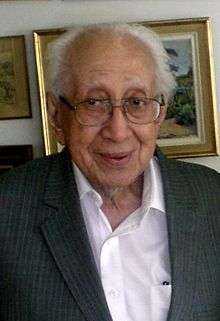 |
Ramón José Velásquez (1916–2014) |
5 June 1993 | 2 February 1994 | Interim government | Writer | |
| Democratic Action | ||||||
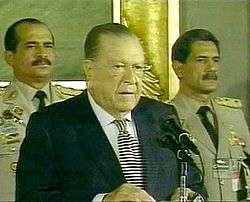 |
Rafael Caldera (1916–2009) |
2 February 1994 | 2 February 1999 | Direct elections | Lawyer | |
| National Convergence | ||||||
 |
Hugo Chávez (1954–2013) |
2 February 1999 | 10 January 2001 | Direct elections | Officer (Lt. Colonel) | |
| Fifth Republic Movement | ||||||
Bolivarian Republic of Venezuela (1999–present)
Venezuela became the Bolivarian Republic of Venezuela (Spanish: República Bolivariana de Venezuela) with the adoption of the 1999 constitution, which renamed the country in honor of Simón Bolívar. The new constitution was promulgated by President Hugo Chávez, who served de jure from 1999 until his death in 2013. The new constitution augmented the presidential term from five years to six years.
Chávez's presidency was interrupted shortly in 2002 following a failed coup d'état attempt that put Pedro Carmona in office for a day. After government-loyal forces ousted Carmona from Miraflores, Vice President Diosdado Cabello assumed executive control for a couple of hours until Chávez could be restored. In 2009, a constitutional referendum approved the elimination of term limits, which allowed Chávez to be re-elected again in 2012. However, the President died in March 2013, only three months into his fourth term, and was succeded by his Vice President Nicolás Maduro, who was elected as President for a six-year term the following month.
Political paties Fifth Republic Movement/United Socialist Party Independent
| | ||||||
|---|---|---|---|---|---|---|
| Portrait | Name (Birth–Death) |
Term in office | Party | Vice President(s) | ||
 |
Hugo Chávez (1954–2013) |
10 January 2001 | 12 April 2002[9] | Fifth Republic Movement | Rodríguez Bastidas Cabello | |
| Re-elected at the 2000 presidential election (first election under the new constitution); rule by decree (2000–2001); 2001 strikes; 2002 Venezuelan coup d'état attempt. | ||||||
 |
Pedro Carmona (1941–) |
12 April 2002 | 13 April 2002 | Independent | vacant | |
| Businessman, union leader and president of the Venezuelan Federation of Chambers of Commerce; installed as interim president by rebel military in the 2002 coup d'état attempt. | ||||||
 |
Diosdado Cabello (1963–) |
13 April 2002 | 14 April 2002 | Fifth Republic Movement | vacant | |
| Engineer and politician. Acting president as Vice President. Would go on to become speaker of the National Assembly, Minister of Interior and Justice, governor of Miranda and two-times deputy of the National Assembly. | ||||||
 |
Hugo Chávez (1954–2013) |
14 April 2002 | 5 March 2013[10] | Fifth Republic Movement | Rangel Rodríguez Carrizales Jaua Maduro | |
| United Socialist Party | ||||||
| Restoration. Venezuelan general strike of 2002–03; Venezuelan recall referendum, 2004; introduction of the Bolivarian Missions; speech at the UN; creation of ALBA; 2006 presidential election; 2007 referendum; 2009 referendum; 2012 presidential election; death and state funeral. | ||||||
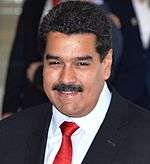 |
Nicolás Maduro (1962–) |
5 March 2013 | Incumbent | United Socialist Party | Arreaza Istúriz | |
| Former union leader and bus driver.[11]Acting president as Vice President following Chávez's death. Elected as President at the 2013 election. Rule by decree (2013–2014); shortages and recession; 2014–16 protests; rule by decree (2015–2016); 2015 parliamentary election. | ||||||
See also
Notes
- ↑ "Chavez wins chance of fresh term". BBC News Online. February 16, 2009.
- ↑ (Spanish) "Presidentes de Venezuela". Consulado General de Bucaramanga. Archived from the original on August 1, 2010.
- ↑ Briceño Perozo, Mario. "Mendoza, Cristóbal de" in Diccionario de Historia de Venezuela, Vol. 3. Caracas: Fundación Polar, 1999. ISBN 978-980-6397-37-8.
- ↑ Bustillos was appointed to the presidency in a provisional fashion after Juan Vicente Gómez, after himself being elected (by the National Assembly) as president. Gómez opted not to assume the presidency, instead choosing to continue in the role of commanding the Venezuelan Army.
- ↑ Rohter, Larry (22 September 2001). "Marcos Pérez Jiménez, 87, Venezuela Ruler". The New York Times. Retrieved 20 January 2016.
- ↑ Ledezma, Eurídice (21 September 2001). "Obituary: General Marcos Pérez Jiménez". The Guardian. Retrieved 20 January 2016.
- ↑ On May 21, 1993, Pérez resigned after being accused of corruption by the Attorney General.
- ↑ Octavio Lepage was the President of Congress and was in charge of the government until Ramón J. Velásquez was elected by Congress on June 5, 1993.
- ↑ On April 11, 2002, senior military officers refused Chávez's orders to carry out Plan Ávila. They launched a coup d'état attempt, arrested Chávez (saying he had resigned), and Pedro Carmona assumed the presidency on April 12. Following an uprising, aided by sectors of the military loyal to Chávez, the new government collapsed and Chávez was restored to power early on April 14. Between the deposing of Carmona on April 13 and the return of Chávez, Vice President Diosdado Cabello assumed the presidency.
- ↑ Chávez was never inaugurated for his fourth term due to his illness, and he died before inauguration could take place.
- ↑ Wallis, Daniel (March 6, 2013). "Venezuela's Maduro: from bus driver to Chavez's successor". Reuters. Archived from the original on July 1, 2013.
References
- (Spanish) "Nuestros Presidentes – Official government portal for presidential biographies". Archived from the original on July 17, 2011.
- (Spanish) Cuadro de Presidentes Venezolanos
- (Spanish) Presidentes y jefes de Gobierno
- (Spanish) Comentarios sobre la Lista de Presidentes
External links
| |||||||||||||
| ||||||||||||||
| ||||||||||
| ||||||||||

